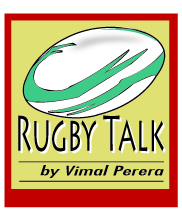A closer look at the physical aspects of rugby
View(s):Lou Holtz an American Football Player and coach said “Ability is what you’re capable of doing. Motivation determines what you do. Attitude determines how well you do it.” This is something that should consistently ring in the minds of rugby players at whatever level they perform. Whether it is community rugby, school, club or national rugby there is no substitute. The numbers taking short cuts to fame can be seen as we periodically hear of players been guilty to taking banned substances. Beware of the various short cuts that are touted.
Rugby in Sri Lanka has resources in the form of natural players. Especially the requirements for sevens are in them. Having natural resources alone will not help us get on top of Asian Rugby. We need the talent to be human resources that will take rugby to the top. That resource includes commitment, and a mindset to make a better rugby player. This includes attitude to training, physical development, and improvement in skill and application. It is not about the money you spend and the number of hours of practice put in a day. It is about how well you spend that money and how well you practice.
Recently I was told; a young 15 year old had been asked to load 200 kg while doing a squat. I asked why and the answer was to be a good prop forward. Looking at his structure I did not think he has much future in that position as possibly he may have looked big at 14 or 15 and thought as ideal to play as a prop. He is growing out of the squatty frame and the role and probably should be a lock with all that he has on display. Just as much as pushing excessive weight at the lower age group may not be the best the; inability to chart the long term player development is also bad.
Strength training, not weightlifting said an article that was published by Mayo Clinic. It went onto say “for kids, light resistance and controlled movements are best — with a special emphasis on proper technique and safety. Your child can do many strength training exercises with his or her own body weight or inexpensive resistance tubing. Free weights and machine weights are other options. The problem lies with confusing strength training with weightlifting, bodybuilding or power lifting. These activities are largely driven by competition, with participants vying to lift heavier weights or build bigger muscles than those of other athletes. This can put too much strain on young muscles, tendons and areas of cartilage that haven’t yet turned to bone (growth plates) — especially when proper technique is sacrificed in favor of lifting larger amounts of weight”.
I say this as we have finished a school season and it is time for the players to recover and regroup for next year. It is also time for the club players to start work for the next season and players are migrating from school to club. This is the opportune time to start asking the players about the attitude to training, the physical and mental development as well as skill improvement. Being natural will not suffice unless you train to achieve.
A question a player has to ask and those in charge have to ask the player: Is Your Head Getting in Your Way When it Counts the Most? The commitment to work hard is a need for a rugby player. In this area there is always some focus on conditioning, strength training and skill execution without leaving it to chance. But do we give importance to the critical mental part of the game.
To become a champion requires any athlete to “pay for their physical dues.” There is no shortcut to reaching your goals in this area. You have to work hard, build muscle strength, improve your quickness, increase endurance and the technique required to play this game. By making this kind of physical investment and working hard at it, you are moving closer to your dreams. But you cannot stop there like a lot of rugby players do. To become a champion you must work on the mental side of your game.
You have to be mentally prepared to work hard on the physical side and to the competitive requirement to win. The difference between playing well or poorly lies in physical and mental. When the competitive pressure is turned up high, playing to your potential is all about how well you can control the mind. Concentration is the key to performance excellence. If you lose control of your focus and concentrate on the wrong things either before or during your game then you will undermine your confidence. Particularly when you concentrate on unwanted actions and retorts on the opposition and also on what the referee should do.
You have to avoid getting psyched out or intimidated? Playing your best when it counts the most demands that you stay centered and “play your game.” If you are in the habit of allowing your concentration to stray you will quickly find yourself getting psyched out and playing tentatively.
I find this question asked repeatedly by people who matter: How do we win and I am tempted to say “get your head examined.”
- Vimal Perera is a former Rugby Referee, coach and Accredited Referees Evaluator IRB


